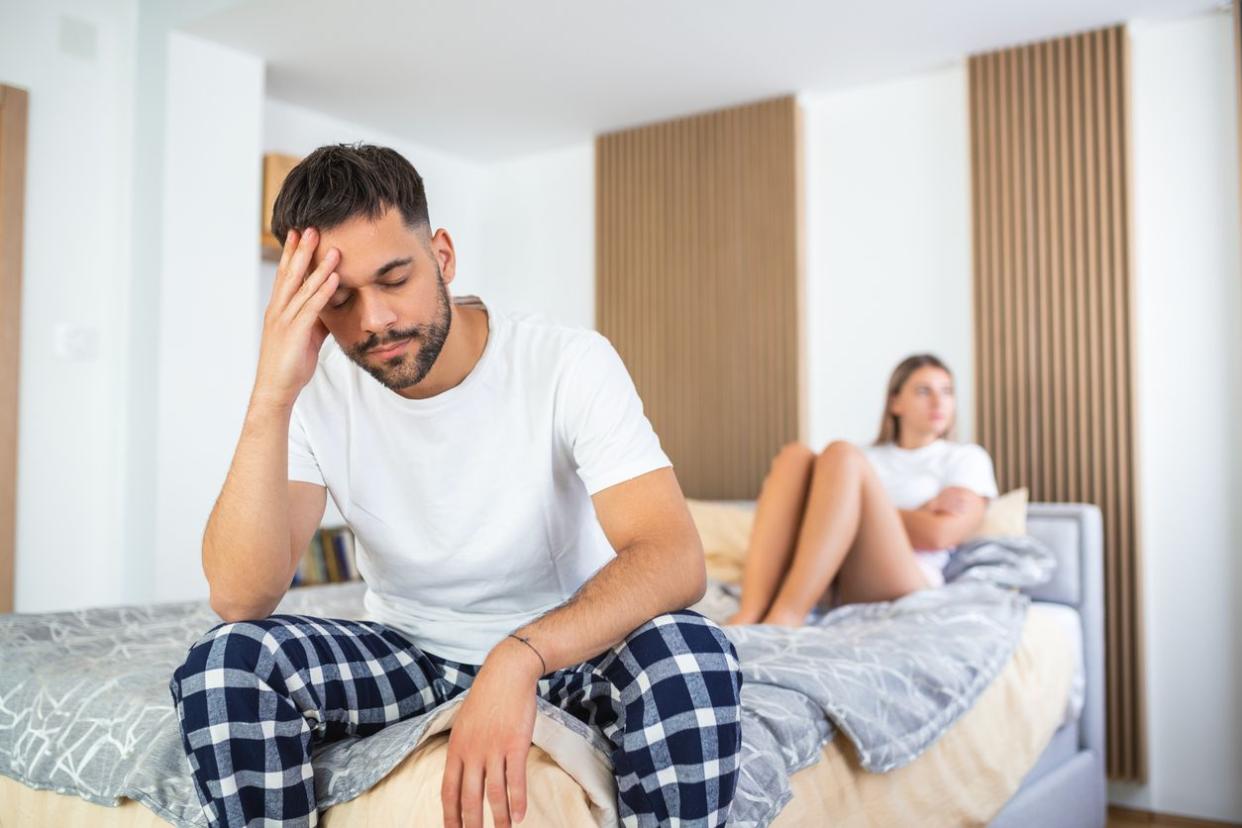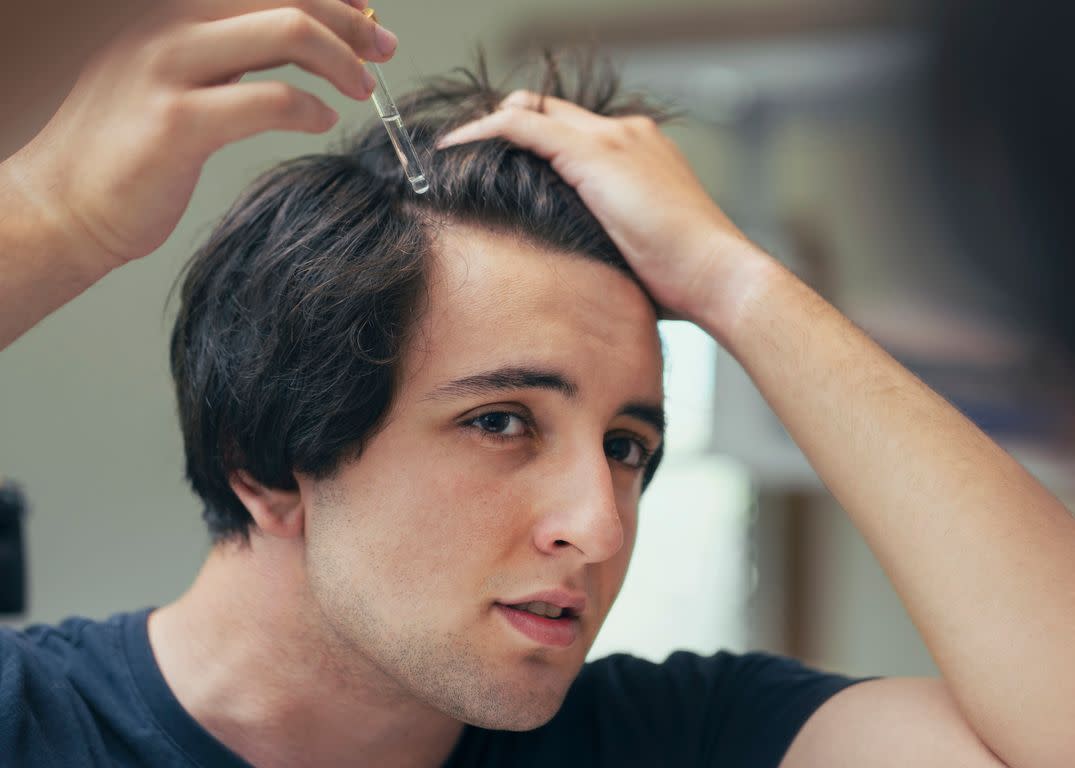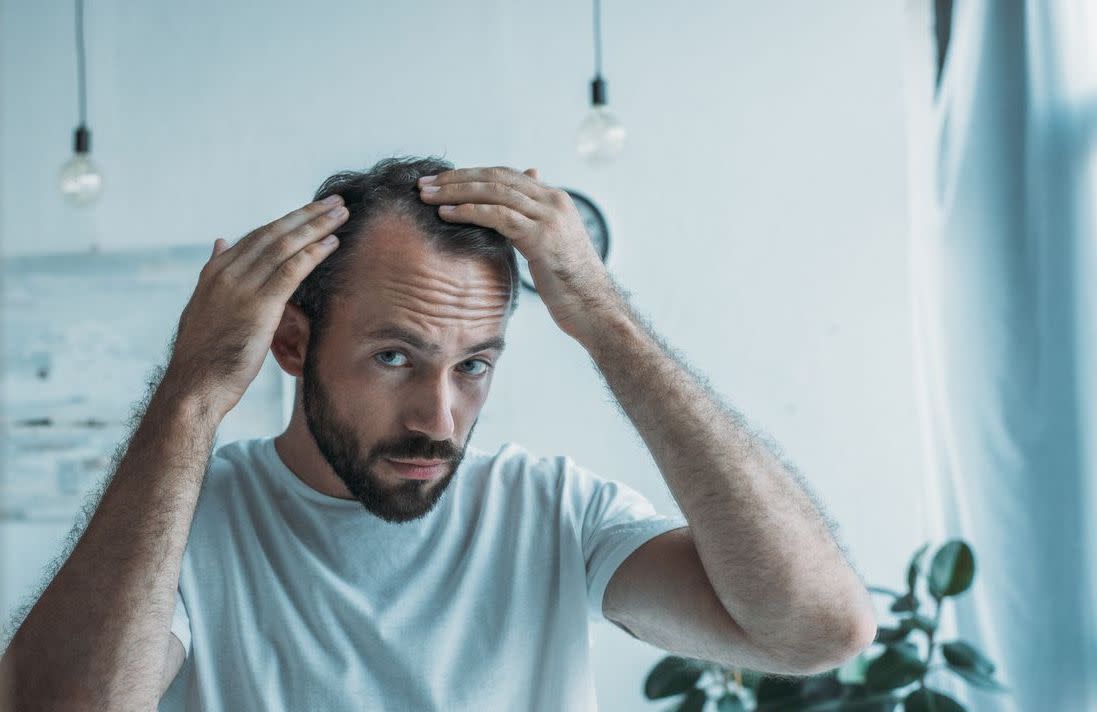
ajr_images/iStock
Is 5mg or 1mg Finasteride Better for Hair Loss?
Let’s talk about 5mg of finasteride versus 1mg: two different doses, one powerful hair loss treatment.
Finasteride is the active ingredient in Propecia®, an oral medication clinically proven to treat and prevent male pattern baldness. It was approved by the Food and Drug Administration (FDA) in 1992 to treat benign prostatic hyperplasia, and in 1997 it was also approved to combat hair loss.
Finasteride is one of two medications (minoxidil, or Rogaine®, is the other) proven to help men keep their hair. Using finasteride can also help you regrow hair.
What is the difference between finasteride 1 mg and finasteride 5 mg, and which dose is right for you? Read on to find out how they work, when to use them, and what dose makes the most sense for you.

cabuscaa / iStock
What is Finasteride?
Finasteride is in a class of drugs so-called 5-alpha-reductase inhibitors or 5α-reductase inhibitors. They work by inhibiting the effects of an enzyme known as 5-alpha reductase, which converts testosterone into dihydrotestosterone (DHT), a hormone responsible for hair loss in men. (Learn more about Finasteride for Hair Loss: Side Effects, Dosage and More.)
5-alpha reductase blockers lower DHT levels, slowing, stopping or reversing the effects of male pattern baldness. They can also promote hair growth and increase the number of hairs.
Research shows that a typical dose of finasteride reduces DHT levels in your blood by as much as 70 percent compared to a placebo.
It can also reduce DHT levels in your prostate gland by 90 percent, which can effectively treat androgenic alopecia and an enlarged prostate.

Kanur Ismail / iStock
Finasteride 1mg uses
The usual dose of finasteride for hair loss is 1 mg per day, but your healthcare provider will decide what is best for you. Most hair loss treatments containing finasteride use this dose, including the original 1 mg Propecia tablets.
Research supports this. One study found that 80 percent of men saw improvements after use 1 mg finasteride for 12 months to treat male pattern hair loss.
Another older study showed this 83 percent of men retained their hair after two years with 1mg finasteride, compared to only 28% with a placebo.
But the thing is, more finasteride isn’t necessarily better. For hair loss, 1 mg finasteride per day is sufficient. Taking more will not improve results and may increase your risk of side effects.

Rawpixel/istockphoto
Finasteride 5mg uses
When should men consider a higher dose of finasteride? While the 1mg dose of finasteride is effective in treating hair loss, the 5mg dose targets prostate-related problems.
Usually the dose of finasteride is 5 mg prescribed for benign prostatic hyperplasia (BPH) or enlarged prostate.
BPH is a non-cancerous condition that makes urination difficult because the enlarged prostate presses against the urethra. Almost all men will suffer from BPH at some point in their lives.
The 5 mg dose of finasteride for BPH, often sold under the brand name Proscar®, helps control prostate growth and relieve BPH symptoms, such as problems with urination.
Remember, this dose of finasteride is not for hair loss.

Kunlathida Petchuen / iStock
Finasteride side effects
Finasteride is generally safe and does not interact with other medicines. However, like all prescription medications, it can have potential side effects.
Happy, less than two percent of men report these problems, indicating a low overall risk.
Possible side effects involve:
The most common side effects are decreased drive, ED, and difficulty finishing.
Here’s how these possible side effects vary depending on dosage:

stefanamer / iStock
Side effects of Finasteride 1mg
Potential side effects of finasteride at a dose of 1 mg include:
Serious side effects from finasteride treatment are very rare, especially at the smaller dose. And decreased urges – the most common side effect of finasteride – affect only 1.8 percent of men who take it.

PhanuwatNandee / iStock
Side effects of Finasteride 5 mg
Compared to the 1 mg dose, finasteride 5 mg has some more noticeable side effects.
In clinical trials, eight percent of men taking finasteride 5 mg experienced erectile dysfunction, six percent of men reported impaired driving ability, and just under four percent noted impaired driving ability. volume.
Other side effects reported by men taking finasteride 5mg include:
Although discontinuation of both lower and higher doses of finasteride due to erectile dysfunction is rare, it does occur.

Nephron / Wikimedia Commons
Finasteride and risks of prostate cancer
Finasteride has been shown to reduce the overall risk of prostate cancer. However, some old study from 1993 suggested it could increase the risk of high-grade prostate cancer.
These previous findings are now believed to be due to detection bias and other factors. Today, the scientific consensus is that finasteride is a safe hair loss treatment for most men.
A 2019 study with 10,000 participants found no link between finasteride and an increased risk of prostate cancer.

seb_ra/istockphoto
Other forms of finasteride
For men pursuing hair restoration, finasteride is usually taken in pill form, but it can also be applied directly to the hair and scalp.
Topical finasteride has not yet been approved by the FDA, scientists are working on it. Recent clinical trials show that topical finasteride is as effective as oral finasteride, but may be safer. (Learn more about How to make topical finasteride.)
Although it can cause skin irritation like many topical treatments, topical finasteride generally has less of an effect on your body.
Research shows that the concentration in your bloodstream is over 100 times lower with topical finasteride versus the oral version.
Because it does not circulate throughout your system, it affects fewer organs and tissues.

gorodenkoff/istockphoto
5 mg finasteride versus 1 mg finasteride: what is the right dosage for me?
Finasteride is available in 1 mg or 5 mg tablets. For male pattern baldness, you should stick to the dose of 1 mg per day, or follow the advice of a healthcare professional.
Here is a summary of what you need to know about 5mg finasteride vs 1mg:
-
It’s effective. Finasteride works. Just 1 mg of finasteride has been proven to effectively treat male pattern baldness. Most of the time you will see results within 3-6 monthsand with consistent use, most men retain most of their hair even two years later.
-
Combined treatment may be more powerful. Finasteride is even more effective for hair loss in men when combined with minoxidil. Curious about this option? Talk to a healthcare provider.
-
More is not better. When taking finasteride for hair loss, a higher dose will not reduce the severity of your hair loss hair lossimprove hair growth or accelerate your results. But it can increase your risk of sexual side effects, so we highly recommend saving the 5mg dose for BPH needs.
This article originally appeared on Hims.com and was syndicated by MediaFeed.org.

LightFieldStudios/istockphoto